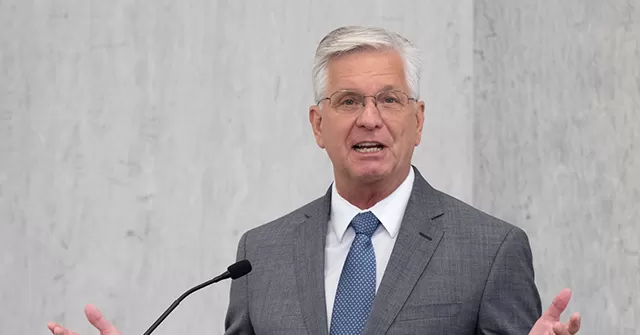In recent years, the topic of tariffs has been a contentious issue in economic and political discussions. Many have argued that tariffs are detrimental to national economic strategy and can lead to instability in prices. However, Christopher Waller, one of the newest members of the Federal Reserve, has a different view. In fact, he believes that tariffs can be a useful tool rather than a threat, and this could potentially change the way Washington approaches economic policies.
Waller’s view was recently highlighted in the Breitbart Business Digest, where he argued that tariffs will not derail the Fed’s plans for rate cuts. This is a significant statement, as it challenges the traditional belief that tariffs and rate cuts are incompatible. Waller believes that tariffs can actually complement the Fed’s efforts to maintain stable prices and support national economic strategy.
One of the main concerns with tariffs is that they can lead to inflation, causing prices to rise and reducing the purchasing power of consumers. This can have a negative impact on the economy, as people may be less likely to spend and invest. However, Waller argues that the Fed has the tools to counteract any inflationary effects of tariffs. This includes adjusting interest rates to keep inflation in check.
Moreover, Waller believes that tariffs can be used strategically to achieve specific economic goals. For example, tariffs can be used to protect domestic industries and promote job growth. This is particularly relevant in the current global trade environment, where countries are engaging in trade wars and protectionist policies. With tariffs, the US can protect its own industries and workers, while also pressuring other countries to negotiate fair trade deals.
Waller’s view also challenges the notion that tariffs are harmful to the overall economy. He believes that the impact of tariffs on the economy can be limited and localized. This means that while certain industries may be affected by tariffs, the overall economy can still thrive. In fact, Waller argues that tariffs can even stimulate economic growth by encouraging companies to invest in domestic production and innovation.
It is worth noting that Waller’s view is not without its critics. Some economists argue that tariffs can lead to retaliatory measures from other countries, which could have a domino effect on the global economy. They also point out that tariffs can create uncertainty for businesses, making it difficult for them to plan and invest.
However, Waller’s argument for tariffs as a useful tool for economic policy should not be dismissed. In fact, his view has gained support from some of his colleagues at the Fed. This includes Fed Chairman Jerome Powell, who recently stated that tariffs are not a major factor in the Fed’s decision-making process.
Furthermore, Waller’s view aligns with President Trump’s approach to trade and economic policies. The President has been a strong advocate of tariffs as a means to protect American industries and workers. With Waller’s support, the administration may be able to implement tariffs with more confidence, knowing that the Fed is not opposed to them.
In conclusion, Christopher Waller’s view on tariffs is a refreshing perspective in the ongoing debate on their effectiveness and impact on the economy. If his view prevails at the Fed, it could potentially change the way Washington approaches economic policies. Tariffs would no longer be seen as a threat, but rather a useful tool to support national economic strategy. As the economy continues to face challenges and uncertainties, Waller’s view offers a new perspective and potential solution.






![Complete BritRail Pass Guide [Types, How to Use It, Pros + Cons]](https://inside-news.uk/wp-content/uploads/2025/06/00221EB4-BCA2-4DBB-6CD4-83DBC37D71FA-120x86.webp)















